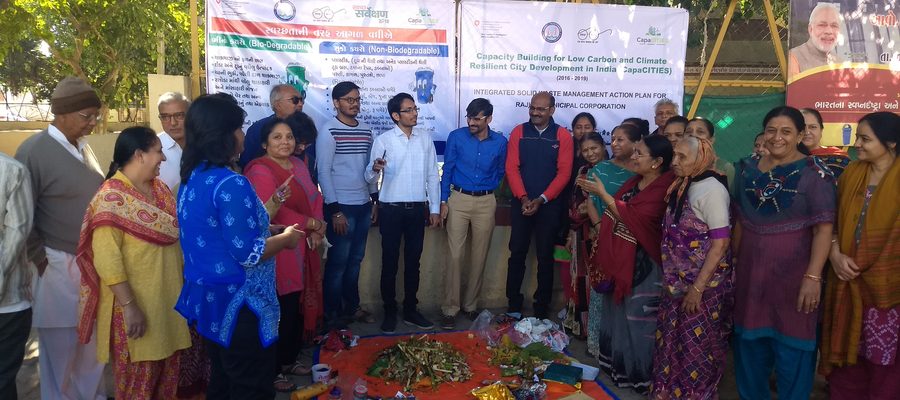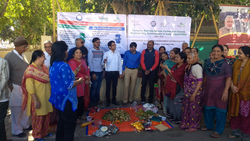Quantification and Characterisation of Municipal Solid Waste conducted in Rajkot under the CapaCITIES project

In order to support the city in its larger objective of sustainable waste management, with focus on the reduction of GHG emissions from waste disposal, ICLEI South Asia, under the project Capacity Building for Low Carbon and Climate Resilient City Development (CapaCITIES), supported by the Swiss Agency for Development and Cooperation (SDC) conducted quantification and characterisation of municipal solid waste generated in three zones of the city.
The study was conducted for a week in three wards viz. 10, 14 and 15 with the support of municipal staff of Rajkot Municipal Corporation (RMC). The data generated will be used while preparing an Integrated Solid Waste Management Action Plan for the city. ICLEI South Asia, along with other Swiss partners – South Pole Group and Econcept, is supporting the city in the implementation of the CapaCITIES project.

The Solid Waste sector contributes to 7.43% (2015-16) of the total GHG emissions that result from city activities. Addressing climate change impacts and implementing GHG emission mitigation actions in the solid waste sector, as in all other urban service sectors, is a key consideration of the City. To this effect, RMC officials with support from ICLEI South Asia have been conducting field level surveys to quantify and characterise solid waste generated in three zones of the city. The data generated will be used to define the size and type of waste processing that is required for the city.
Further, under the (CapaCITIES) project, an awareness generation programme was conducted in three wards namely – Ramnagar Colony of Ward No. 15, Geeta Nagar Colony of Ward No. 14 and Prakash Society in Ward No. 10 on the 26th of December.
In a bid to sensitise citizens towards the importance of source segregation, municipal staff demonstrated the characterisation of waste generated and collected in the area. Citizens were sensitised towards waste constituents and their impacts on public health and hygiene.
An appeal was made to public to initiate and practice source segregation so that segregated waste can be further processed to generate revenue. Wet waste could be processed either by composting or used for producing energy through bio-methanation process. Recycling (paper, plastics, metal, and glass) and further use of combustibles to produce energy in a waste to energy plant are also considered. Aspects of hazardous wastes, electronic waste and sanitary waste disposal were also discussed.
Municipal Commissioner Mr. Banchhanidhi Pani, RMC also visited Geeta Nagar Colony on the 26th of December, and interacted with public thereby motivating them to practice source segregation. The Commissioner discussed and motivated citizens to actively contribute to and participate in making the city cleaner and help to meet the larger goals of the Swachh Bharat Mission.
